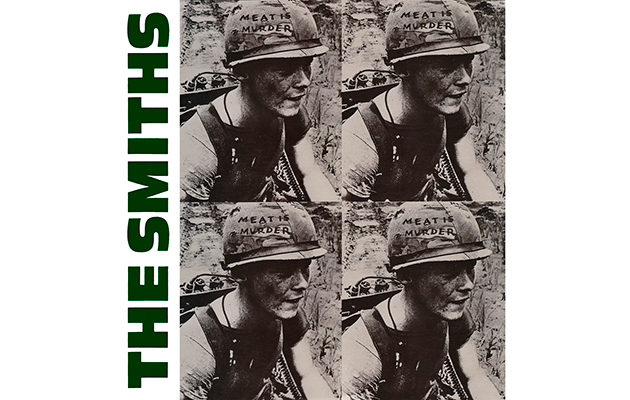https://www.youtube.com/watch?v=rQjgJWmmRtA
Andy Rourke remembers the Meat Is Murder shows as “crazy”, Tim Booth recalls the “intense devotion” of the audiences, while Dave Harper describes the atmosphere as “so hot and exciting, there was sweat down the walls”. Stuart James explains his principal duties during the shows themselves were dissuading enthusiastic audience members from getting onstage. “Later, though, it got to the point where the band wouldn’t think they’d had such a good show if they didn’t have a stage invasion,” he relates.
“You get the lads of terraces,” says Richard Boon. “Both terrace housing and football terraces, embracing the ambiguous character that Morrissey was intent on presenting. The last time I saw Morrissey live was at the Albert Hall when You Are The Quarry came out; it was full of football kids wearing flags and chanting. That started around Meat Is Murder.”
“Morrissey was a very sensitive human being, and he had this real love/hate relationship with his fame,” observes Tim Booth. “He loved it, he wanted it desperately, but he was also pretty terrified of people and terrified of what came with it. He was caught between two opposing forces. He used to hide in his hotel. He wouldn’t go out, he found it overwhelming.”
“He loved the attention as we became famous,” adds Rourke. “But if fans get too close, we always ended up in situations where Morrissey more often than not was uncomfortable. People were over familiar with him. And bodily contact, people hugging him and kissing him. Onstage, he was fine, but not anywhere else.”
On March 16, The Smiths played Hanley Victoria Hall in Stoke-On-Trent. A few lines into “Meat Is Murder” an object thrown from the crowd struck Morrissey. “It was a dozen sausages with ‘Meat is murder’ written on them,” explains Rourke. “They’re quite weighty, a pack of sausages, hitting you in the face. That shocked him. Then, when he looked down he saw that it was meat. He was disgusted and he just walked offstage. They were Irish sausages. How do I know? I went to the trouble of wrapping them back up in the plastic. It was like a brick hit him in the face. If they’d unravelled, he may have got strangled by them.”
“Morrissey loved being onstage, but he didn’t like the boring, mundane, hard work of the travel,” says Dave Harper. “With vegetarians, there’s always the associated illness as they’ve been eating crisps for six weeks. I don’t think it did him a lot of good healthwise, because until you get to another level you’re not getting any decent food – and if you’re a vegetarian, on top of that you’re certainly not getting decent food, because no-one’s catering for you.”
As the Meat Is Murder tour progressed, without a manager and in a period of extraordinary activity, the band responded to the increased pressure in different ways. “Everything got louder than everything else,” says John Featherstone. “The need to do press and promotion, the need to do shows. It all got too much. Johnny thrives on that stuff to the point of exhaustion. But when Morrissey felt burdened, he would push away. He’d get physically, intellectually and emotionally more distant. He’d cancel interviews and pull back. Johnny and Morrissey both set up professional methodologies that got defined on that tour.”



